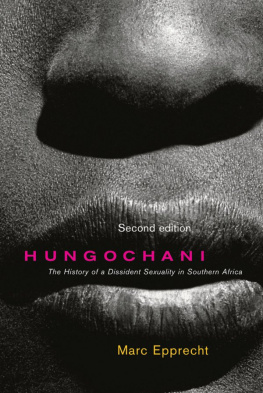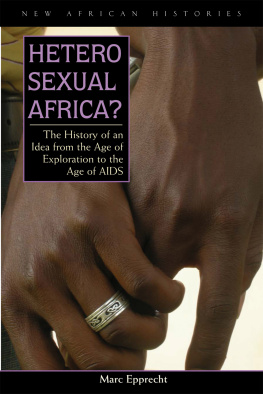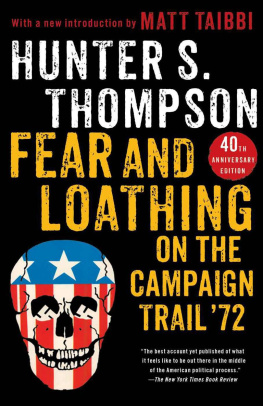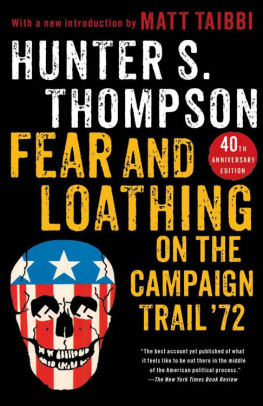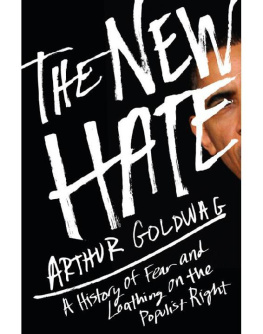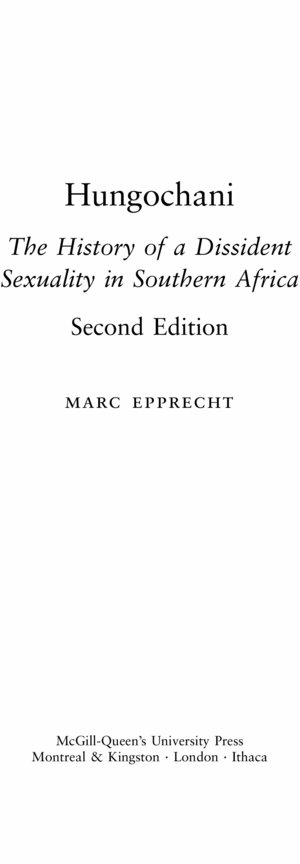This book was first published with the help of a grant from the Canadian Federation for the Humanities and Social Sciences, through the Awards to Scholarly Publications Program, using funds provided by the Social Sciences and Humanities Research Council of Canada.
McGill-Queens University Press acknowledges the support of the Canada Council for the Arts for our publishing program. We also acknowledge the financial support of the Government of Canada through the Canada Book Fund for our publishing activities.
Hungochani : the history of a dissident sexuality in southern Africa /Marc Epprecht. 2nd ed.
Includes bibliographical references and index.
1. Homosexuality Africa, Southern. 2. Male homosexuality Africa, Southern History. 3. Gays Africa, Southern Social conditions. I. Title.
Typeset by Interscript.
Preface
Research for this book began in 1996 when I was employed as a lecturerat the University of Zimbabwe. My original goal was a simple one totest the homophobic and xenophobic claims of certain Zimbabwean leaders against the empirical evidence. I hoped to gain new perspectives onmyself as a scholar, hoping to see better and so expunge heterosexism inanother research project that was then coming to a close. Over the years,I also increasingly grew to admire the courage and joie de vivre of themany gay rights and feminist activists in the region with whom I came incontact. I thus sought to make the research useful to their struggles andto strengthen their ability to enrich Zimbabwean civil society.
Developments have since added urgency to that motivation. Indeed, thehealth and political situation in southern Africa has worsened considerably.The epidemiological terms of the deterioration alone bear reiterating here,as they do in each and every forum possible, so calamitous are they. Asthe Worldwatch Institute summarized it, referring only to the HIV/AIDSpandemic and not the related famine, other health crises, and politicalviolence: In Zimbabwe, without AIDS, life expectancy in 2010 would be70 years, but with AIDS, it is expected to fall below 35 years. Botswanaslife expectancy is projected to fall from 66 years to 33 years by 2010. ForSouth Africa, it will fall from 68 years to 48 years. And for Zambia, from60 to 30 years. These life expectancies are more akin to those of the MiddleAges than of the modern age (Brown 2000).
The HIV/AIDS pandemic has exacerbated what sociologist Allison Goebelhas termed the gender wars in the region domestic violence, childabuse, witchcraft, and more. It has increasingly drawn the urgent attentionof activists, health practitioners, and scholars across the disciplines. Thepresident of South Africa, Thabo Mbeki, further underscored the urgencywhen in 1999 he appeared to condone the suppression of evidence and offearless discussion of sexuality. Mbekis government aligned itself (briefly)against the overwhelming weight of scientific research by seeming to denythat HIV causes AIDS. He suggested as well that those who advocateexplicit and honest sexual education might be pursuing a racist agendaagainst black males. Partly on this basis, and appealing to African nationalist claims about the need for African independence from Westerndomination, the government of South Africa prevented the importation ofcheap anti-retroviral drugs and refused to take advantage of unprecedentedprice and patent concessions by Western drug manufacturers. This was ashocking development to those of us who worked and lived in the regionand have seen colleagues, friends, students, and loved ones die of thedisease the large majority of the population, in other words.
Such is the context that shaped the course of the research and the wayI have written this book. Many individuals also directly contributed to thedevelopment of the ideas within it. Above all I need to express my deepestgratitude to the members and ex-members of Gays and Lesbians of Zimbabwe (GALZ), who welcomed me as an ally. Keith Goddard, first,graciously accepted a strangers congratulations when he was so obviouslyexhausted from the book fair imbroglio that introduced homosexualityinto Zimbabwean political discourse back in 1995. Since then Keith hasbeen unfailingly generous in sharing his time, energy, and wonderful criticalpowers.
The members of the Gay Oral History Project who conducted interviews were Rodgers Bande, Romeo Tshuma, Polyana Magwiro, WallaceZimunya, Tina Machida, Douglas Zinguwo, and Lionel Dube. Susie Bruceand Bev Clark gave time and thought to helping me. We all owe a debtto those informants who shared their knowledge and insights whilerequesting anonymity.
Outside of GALZ but still in Zimbabwe, Nyaradzo Dzobo did stellarinterviews in the rural areas. Students of my 1997 History of SouthernAfrica class at the University of Zimbabwe also contributed short interviewsthat enriched our understanding of the migrant life: Cuthbert Karise, JoshuaChakawa, Tongai Mazorodze, Samboko Manfred, Pemberayi Zambezi,Last Hobwani, Dee Jamela, Norman Makuyana, Silvernos Chipodzo, Hazvinei Chitsike, and Ephraim Chisalo. Tapiwa Zimunya, Debra Lovinsky,and Koni Benson helped with archival material.
Some of my travel and local knowledge was made possible by thegenerous hospitality of Kings Phiri, Nick Southey, Shirley Brooks, JohnGay, Judith Gay, Gerard Mathot, Graeme Reid, Chris and Vin Hamblin,Charles Shayanewako, Nyaradzo Dzobo, Mary Turner, and DagHenrichson.
Funding over the years has been provided by the University of Zimbabwe, the South-South Exchange Programme for Research in the Historyof Development, Gays and Lesbians of Zimbabwe, and the Social Sciencesand Humanities Research Council of Canada. I would like as well to thankthe organizers of the Colloquium on Masculinities, University of Natal, July1997; the organizers of the Future of the Queer Past conference at theUniversity of Chicago, September 2000; Local 3908 of the Canadian Unionof Public Employees; the Canadian Association of African Studies; QueensUniversity; and the Social Science Research Council (of the United States),for help in getting to various important conferences.
I would also like to thank (in more or less chronological order) WolframHartmann, David Beach, Patricia McFadden, Susan Heald, Nick Southey,Jock McCulloch, Zackie Achmat, Stephen O. Murray, Robert Morrell,Kendall, Tim Burke, Gerhard Mathot, Amy Kaler, Oliver Phillips, DeborahAmory, Neville Hoad, Graeme Reid, Chris Dunton, Karen Dubinsky, AlanJeeves, Dunbar Moodie, Mark Carlton, Glen Elder, Doug Saunders,Belinda Bozzoli, David Coplan, Jeanne Penvenne, Jeremy Martens, GuyThompson, Antony Manion, Gerald Mazarire, and Peter Garlake foradding their critical comments and specialist tidbits of knowledge. Otherswho added their two cents worth at various conferences, archives, saloons,or around a braai in the backyard of 2 Rollo Drive are too numerous todo justice to except by saying I thank you all for your support. Meanwhile,Allison Goebel was there for it all, and particularly to remind me to cutmy sentences in half and to remove over-zealous adjectives from my firstfew drafts. Maureen Garvie provided astute input at the copy editing stage.
Bits and pieces of this book have been published in other fora, in somecases prematurely, meaning that my ideas have since matured and I mayno longer agree with the way I expressed myself in the heat of the firstmoment of discovery. Where readers notice a nuance in meaning betweenhere and there, the present interpretation supercedes anything that camebefore. I should like to thank the editors and anonymous readers whohelped me with those earlier versions, as well as the publishers of thefollowing journals for permission to reproduce revised versions of myarticles

